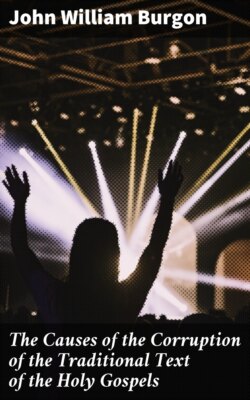Читать книгу The Causes of the Corruption of the Traditional Text of the Holy Gospels - John William Burgon - Страница 13
На сайте Литреса книга снята с продажи.
Оглавление[10] 2 Kings xxii. 8 = 2 Chron. xxxiv. 15.
[11] [This name is used for want of a better. Churchmen are Unitarians as well as Trinitarians. The two names in combination express our Faith. We dare not alienate either of them.]
[12] See The Traditional Text of the Holy Gospels (Burgon and Miller), p. 21, note 1.
[13] See Traditional Text, chapter ii, § 6, p. 33.
[14] [Perhaps this point may be cleared by dividing readings into two classes, viz. (1) such as really have strong evidence for their support, and require examination before we can be certain that they are corrupt; and (2) those which afford no doubt as to their being destitute of foundation, and are only interesting as specimens of the modes in which error was sometimes introduced. Evidently, the latter class are not 'various' at all.]
[15] [I.e. generally κραβαττον, or else κραβατον, or even κραβακτον; seldom found as κραββαττον, or spelt in the corrupt form κραββατον.]
[16] I am inclined to believe that in the age immediately succeeding that of the Apostles, some person or persons of great influence and authority executed a Revision of the N.T. and gave the world the result of such labours in a 'corrected Text.' The guiding principle seems to have been to seek to abridge the Text, to lop off whatever seemed redundant, or which might in any way be spared, and to eliminate from one Gospel whatever expressions occurred elsewhere in another Gospel. Clauses which slightly obscured the speaker's meaning; or which seemed to hang loose at the end of a sentence; or which introduced a consideration of difficulty:—words which interfered with the easy flow of a sentence:—every thing of this kind such a personage seems to have held himself free to discard. But what is more serious, passages which occasioned some difficulty, as the pericope de adultera; physical perplexity, as the troubling of the water; spiritual revulsion, as the agony in the garden:—all these the reviser or revisers seem to have judged it safest simply to eliminate. It is difficult to understand how any persons in their senses could have so acted by the sacred deposit; but it does not seem improbable that at some very remote period there were found some who did act in some such way. Let it be observed, however, that unlike some critics I do not base my real argument upon what appears to me to be a not unlikely supposition.
[17] [Unless it be referred to the two converging streams of corruption, as described in The Traditional Text.]
